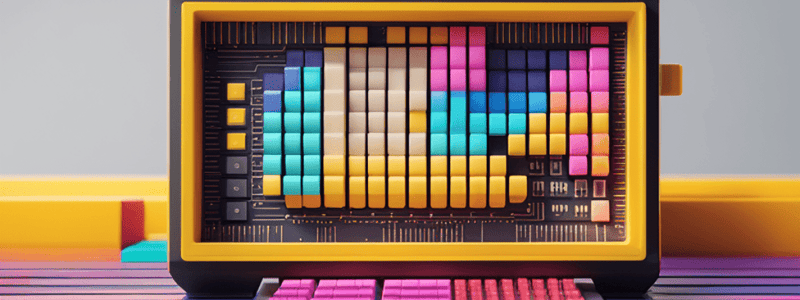Podcast
Questions and Answers
What is the primary advantage of block-based coding on the micro:bit?
What is the primary advantage of block-based coding on the micro:bit?
- Complex Algorithms
- Advanced Syntax
- Lengthy Code Segments
- Ease of Learning (correct)
How does block-based coding help beginners in programming?
How does block-based coding help beginners in programming?
- Reduces Code Visibility
- Increases Complexity
- Lengthens Coding Process
- Provides Visual Programming (correct)
What aspect of block-based coding contributes to students' immediate understanding of code results?
What aspect of block-based coding contributes to students' immediate understanding of code results?
- Long Compilation Time
- Quick Results (correct)
- Delayed Output Display
- Mystery Outputs
How does the micro:bit support interdisciplinary learning?
How does the micro:bit support interdisciplinary learning?
What is the overall impact of the micro:bit on education according to the text?
What is the overall impact of the micro:bit on education according to the text?
Flashcards are hidden until you start studying
Study Notes
The BBC micro:bit: Block-Based Coding and Learning
The BBC micro:bit is a compact, programmable device that inspires students and teachers to explore digital creativity and physical computing since its launch in 2016. The micro:bit's block-based coding environment, called microbit.org/code, is a simple and engaging way to learn programming concepts. This approach is designed to be intuitive, making coding accessible to a wide range of students, including those who may have initially found coding daunting.
Block-Based Coding Benefits
Block-based coding on the micro:bit has several advantages:
- Ease of Learning: Blocks represent actions and are easier to understand for beginners than text-based languages like Python.
- Visual Programming: Blocks are arranged in a visual manner, which helps students understand the flow of the program better.
- Quick Results: Students can see the results of their code immediately, enhancing their motivation and learning experience.
Physical Computing and Learning
Physical computing with the micro:bit combines software and hardware interactions, making learning more engaging, accessible, and motivating. It encourages students to create tangible projects that demonstrate their understanding of the concepts they've learned. The micro:bit's block-based coding environment plays an essential role in this process by facilitating the manipulation of physical sensors and outputs, such as LEDs, buttons, and sound.
Impact on Learning and Education
Studies have shown that the micro:bit positively influences students' predisposition to study computer science, particularly among girls and underrepresented groups. The device promotes critical thinking, resourcefulness, and collaboration, which are essential skills in a technologically advanced world. Additionally, the micro:bit supports interdisciplinary learning, as students can integrate their creations into various subjects, such as art, language learning, and STEM courses.
Teacher Confidence and Support
Teachers are vital to successful micro:bit integration. Teachers' confidence in using micro:bit technology significantly impacts students' motivation and learning outcomes. The microbit.org website provides resources and support to help teachers become more confident in teaching with the micro:bit.
Challenges and Barriers
While the micro:bit has been largely successful in promoting coding and physical computing, it also faces some challenges and limitations:
- Limited Capabilities: Some high-achieving students may not find the micro:bit suitable for their advanced technological needs.
- Teacher Confidence: Teachers' confidence in using the micro:bit impact students' motivation and learning outcomes.
Nevertheless, these challenges are not insurmountable, and the micro:bit community continues to innovate and develop ways to overcome them.
Conclusion
The micro:bit is an excellent tool for introducing block-based coding and physical computing concepts to students. It helps students develop critical thinking, problem-solving, and collaboration skills while promoting their motivation and engagement. The micro:bit's impact on education is far-reaching, with potential implications for interdisciplinary learning, teacher confidence, and student motivation.
Studying That Suits You
Use AI to generate personalized quizzes and flashcards to suit your learning preferences.




